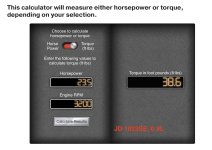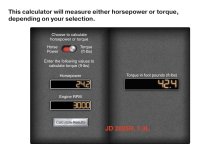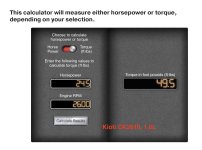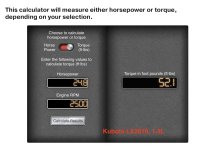S854
Silver Member
- Joined
- Dec 5, 2017
- Messages
- 181
- Location
- Helena, MT
- Tractor
- ‘67 MF 135 Deluxe / ‘22 Kioti CK2610 HST/Bad Boy ZT Elite 54”
Why do manufacturers rate their tractors according to HP rather than torque?
I can see why automakers use HP ratings to sell their cars… to the uninitiate, HP is king — more HP = faster car… (although this isn’t always the case).
Tractors, on the other hand, make better use of torque… maybe I misstated that, torque is better applied using large, lugged tractor tires.
In my compact tractor world, the under 25 HP class, engine displacement varies greatly… and generally speaking, more cubic inches can result in more torque at a lower RPM… everything else being equal… (I.e. bore, stroke, naturally aspirated etc.)
Comparing apples to oranges, JD 25 HP (1.1 liter) to Kioti 25 HP (1.6 liter), it would seem the larger engine would produce a more useable torque curve starting at a lower, more fuel efficient RPM. i realize HP and torque are related, you can’t have one without the other.
I’ve searched forthis information on manufacturers websites… all they list is HP… why wouldn’t a tractor company want to exploit the torque differences between competing brands?
I can see why automakers use HP ratings to sell their cars… to the uninitiate, HP is king — more HP = faster car… (although this isn’t always the case).
Tractors, on the other hand, make better use of torque… maybe I misstated that, torque is better applied using large, lugged tractor tires.
In my compact tractor world, the under 25 HP class, engine displacement varies greatly… and generally speaking, more cubic inches can result in more torque at a lower RPM… everything else being equal… (I.e. bore, stroke, naturally aspirated etc.)
Comparing apples to oranges, JD 25 HP (1.1 liter) to Kioti 25 HP (1.6 liter), it would seem the larger engine would produce a more useable torque curve starting at a lower, more fuel efficient RPM. i realize HP and torque are related, you can’t have one without the other.
I’ve searched forthis information on manufacturers websites… all they list is HP… why wouldn’t a tractor company want to exploit the torque differences between competing brands?



